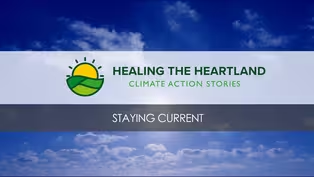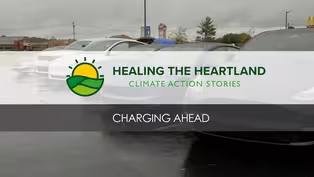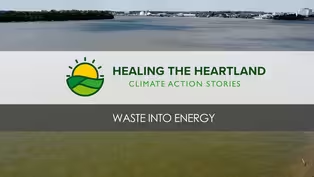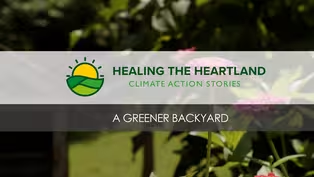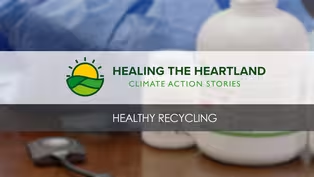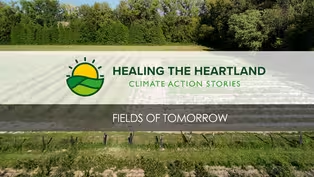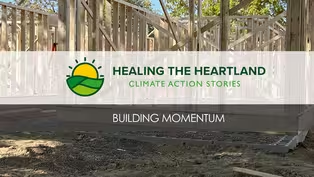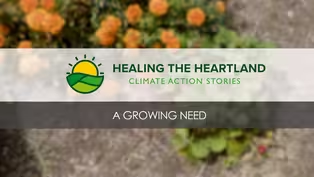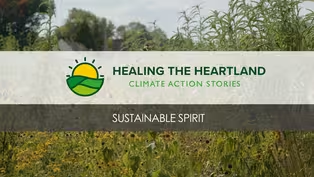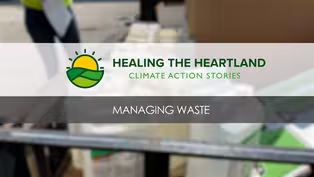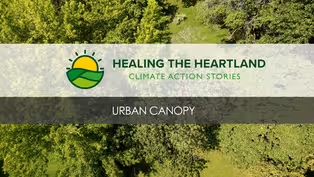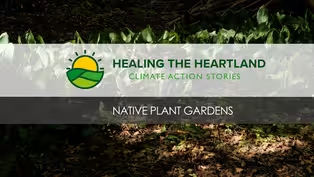Healing the Heartland: Climate Action Stories
Fields of Tomorrow
Clip | 4m 35sVideo has Closed Captions
Sustainable farming practices and innovations.
Sustainable farming practices and innovations.
Problems playing video? | Closed Captioning Feedback
Problems playing video? | Closed Captioning Feedback
Healing the Heartland: Climate Action Stories is a local public television program presented by WNIN PBS
Healing the Heartland: Climate Action Stories
Fields of Tomorrow
Clip | 4m 35sVideo has Closed Captions
Sustainable farming practices and innovations.
Problems playing video? | Closed Captioning Feedback
How to Watch Healing the Heartland: Climate Action Stories
Healing the Heartland: Climate Action Stories is available to stream on pbs.org and the free PBS App, available on iPhone, Apple TV, Android TV, Android smartphones, Amazon Fire TV, Amazon Fire Tablet, Roku, Samsung Smart TV, and Vizio.
So climate change definitely affects me as a farmer, obviously, because all the work is outside.
So when you're at the mercy of Mother Nature and the rain and the hot weather and the cool weather and the wind blowing in the thunderstorms, all of those things can affect your in product, which affects your bottom line.
That's everything.
This is a startup, small produce farm.
In the local area here in Rockport.
So the number one thing that we're doing for sustainability right now is to grow the soil.
One of the things that we do to increase that life and to build the organic matter, is to put decayed plant matter on the soil.
So that leads you to a compost pile.
We get leaves from, the local city.
As well as, there's local farmers that we take upon, their manure from their cattle and their horses.
That goes a long way, as well as, unfortunately, not all of the produce that we pick and grow is number one beautiful.
Or it might go bad.
So we'll take that and add it to the compost as well.
So adding any kind of decayed matter at all can build that compost.
And as you continually turn it, it it puts aerobic life into that compost which when you put that on out onto your soil, it's just it's the most beautiful, tasty food that a plant could ever want.
So I definitely think everybody should try composting, because everybody has some kind of food scraps from their kitchen.
Right?
Anything that you're going to discard that's organic matter can be compost.
keeping that out of the landfill and instead putting it back into the earth or into your garden or wherever is always a net positive Because, a lot of times if your vegetables are already shipped from thousands of miles away, there's already quite the carbon footprint on.
So if you can take that little bit left, of organic matter and use it locally, that's a net positive versus, just toss it in the trash and put it in a plastic bag and toss in a landfill where it never gets used again.
If the climate changes this much just in the short amount of time that I've been doing it.
I'm going to assume that it's only going to continue going that direction.
So that makes me take pause and say, maybe I need to move things inside as in have greenhouses and high tunnels in order to shelter those plants.
anu empowers individuals and communities alike to sustainably grow pure produce that's better for people and the planet.
So we embrace hydroponic farming, which by definition is soiless growing or growing without dirt.
This gives us the ability to grow year round independent of the season or climate or geography, especially when it's done in a controlled environment system.
Indoor farming has the benefit of growing anything anywhere, but that comes at a great cost to be able to create the environment and the life that we need to have that perfect growing season year round can use a lot of energy.
It is so critically important that we have an extremely energy efficiency design that can optimize yield output while minimizing power usage.
And what we created here is a design called Rotary Aeroponics which works a bit like a rotisserie chicken.
We are rotating the plants on this vertical column about the stationary grow lights.
This dramatically reduces the overall LED count, which has immediate energy savings.
but then compounding energy savings because the less lights emit less heat inside the chamber.
we use all home compostable materials, and some of which are upcycle that would have otherwise gone into the waste stream.
We can repurpose for productive uses for growing plants locally.
we've developed these home compostable polymers, these seed ponds that could be composted right at home without ever needing to go to a landfill can allow you to have an organic composting environment all at home, Food needs water.
There's no way to avoid it, but the vast majority of it runs off into waterways, which creates a self-perpetuating cycle of excessive water consumption, excessive water runoff of fertilizers and pesticides, increased water scarcity.
We are in a dangerous cycle, and hydroponics has the potential to break that cycle.
It has the potential to recirculate water to use 95% less water to grow locally on site.
Clip | 3m 44s | Solar systems can be energy and cost efficient for residential and commercial buildings. (3m 44s)
Clip | 4m 19s | Both personal and mass transit electric vehicles greatly reduce greenhouse gas emissions. (4m 19s)
Video has Closed Captions
Clip | 3m 8s | Mesker Park Zoo and the Evansville Water Sewer Utility describe how they turn waste into energy. (3m 8s)
Video has Closed Captions
Clip | 3m 59s | Using native plants to have a lower impact on the environment. (3m 59s)
Video has Closed Captions
Clip | 3m 7s | A partnership between Berry Plastics and Deaconess Health helps reduce medical waste. (3m 7s)
Video has Closed Captions
Clip | 4m 35s | Sustainable farming practices and innovations. (4m 35s)
Video has Closed Captions
Clip | 3m 8s | Affordable, energy efficient housing program and affordable, restorative housing program. (3m 8s)
Video has Closed Captions
Clip | 3m 20s | How choosing local food and reducing food waste can help with climate change. (3m 20s)
Video has Closed Captions
Clip | 3m 31s | Local faith groups talk about the importance of environmental stewardship. (3m 31s)
Video has Closed Captions
Clip | 3m 10s | Dubois County Ag Day featuring plastic, tire, and pesticide container recycling programs. (3m 10s)
Video has Closed Captions
Clip | 4m 29s | Learn about the importance of an urban canopy. (4m 29s)
Video has Closed Captions
Clip | 4m 22s | Native plants combat climate change. (4m 22s)
Providing Support for PBS.org
Learn Moreabout PBS online sponsorship
- Science and Nature

Explore scientific discoveries on television's most acclaimed science documentary series.

- Science and Nature

Capturing the splendor of the natural world, from the African plains to the Antarctic ice.












Support for PBS provided by:
Healing the Heartland: Climate Action Stories is a local public television program presented by WNIN PBS
